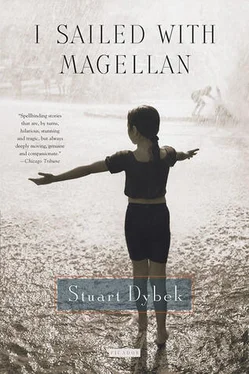Stuart Dybek - I Sailed with Magellan
Здесь есть возможность читать онлайн «Stuart Dybek - I Sailed with Magellan» весь текст электронной книги совершенно бесплатно (целиком полную версию без сокращений). В некоторых случаях можно слушать аудио, скачать через торрент в формате fb2 и присутствует краткое содержание. Год выпуска: 2004, Издательство: Farrar, Straus and Giroux, Жанр: Современная проза, на английском языке. Описание произведения, (предисловие) а так же отзывы посетителей доступны на портале библиотеки ЛибКат.
- Название:I Sailed with Magellan
- Автор:
- Издательство:Farrar, Straus and Giroux
- Жанр:
- Год:2004
- ISBN:нет данных
- Рейтинг книги:4 / 5. Голосов: 1
-
Избранное:Добавить в избранное
- Отзывы:
-
Ваша оценка:
- 80
- 1
- 2
- 3
- 4
- 5
I Sailed with Magellan: краткое содержание, описание и аннотация
Предлагаем к чтению аннотацию, описание, краткое содержание или предисловие (зависит от того, что написал сам автор книги «I Sailed with Magellan»). Если вы не нашли необходимую информацию о книге — напишите в комментариях, мы постараемся отыскать её.
story writer Stuart Dybek returns with eleven masterful and masterfully linked stories about Chicago's fabled and harrowing South Side. United, they comprise the story of Perry Katzek and his widening, endearing clan. Through these streets walk butchers, hitmen, mothers and factory workers, boys turned men and men turned to urban myth.
solidifies Dybek's standing as one of our finest chroniclers of urban America.
I Sailed with Magellan — читать онлайн бесплатно полную книгу (весь текст) целиком
Ниже представлен текст книги, разбитый по страницам. Система сохранения места последней прочитанной страницы, позволяет с удобством читать онлайн бесплатно книгу «I Sailed with Magellan», без необходимости каждый раз заново искать на чём Вы остановились. Поставьте закладку, и сможете в любой момент перейти на страницу, на которой закончили чтение.
Интервал:
Закладка:
Sleep, like a barcarole, carries him away.
Je Reviens
The woman had stopped to browse at the perfume counter. It was Christmas season, Marshall Field’s was mobbed with shoppers, and the counter was a clutter of opened samples — exquisite bottles of myriad shapes and colors. She sorted through them without stopping for so much as a sniff until she found what she was looking for and, raising an atomizer, sprayed a poof into her brunette hair. Then she glanced around to see if anyone was watching, and I pretended to be studying the display of pearl earrings at the jewelry counter so that she wouldn’t catch me staring. Not that if she caught me she would have noticed. Even dressed as I was, in a suit and tie under the old tweed topcoat imported from England that had belonged to my uncle Lefty, I still would have looked like a kid to someone like her.
When I looked up again, she was unbuttoning her coat. She was dressed like a clarinet, reedy thin in a black dress with silver buttons, a silver belt, and a matching necklace. She sprayed one wrist, inhaled the fragrance, then glanced around again, almost furtively, and the thought suddenly occurred to me that this elegantly beautiful woman was about to shoplift a bottle of perfume. Witnessing her theft would make me an accomplice, a partner in crime she didn’t know she had. I found the thought exciting. The two saleswomen in the perfume section were on the opposite side of the counter, busy with customers. It was the perfect moment for the woman to slip the bottle under her coat. Instead, she opened two buttons on her dress, exposing a flash of cleavage and black lace, and quickly sprayed a puff over her breasts. Then, just as quickly, she buttoned up and turned away from the counter into the flow of shoppers.
As soon as she left, I stepped to the spot where she’d been standing. The atmosphere around the perfume counter was heady and thick, all the competing scents merging into a single fragrance that permeated the store. One could smell it immediately upon coming in from the cold through the revolving door. It was like an antidote to the clouds of incense in the church that I’d fled earlier in the day, when the smell of the requiem mass for my uncle Lefty grew suddenly nauseating. I’d left the church in the middle of the service, on the verge of a gagging fit that made my eyes tear. I’d been sitting by myself toward the rear of the church, so neither my mother nor any of the other relatives saw me leave, and if they had they would probably have figured that I needed to get back to my high school classes. The only person who noticed was a middle-aged black woman standing in the vestibule, looking in on the service. She was wearing sunglasses and a filmy black scarf over what may have been a wig. If it was her hair, then she’d dyed it a metallic color that brought out the bronze of her skin. Her fur coat, the kind my mother called Persian lamb, nearly matched the shade of her hair. I’d never seen her before, but as I went past she removed her sunglasses to catch my eye. Her eyes were green, not brown, and she smiled as if she knew me.
“That sharp topcoat don’t quite fit you in the shoulders yet,” she said in a husky voice.
“I guess” was all I could stammer.
“You take care now, Perry,” she said, calling me by name.
Then I was out the huge, ornate door into the blast of frigid downtown air, feeling the exhilaration of an escapee, but at the same time feeling as if I was running out on Uncle Lefty, leaving him to the stink of incense and the insipid organ music he would have despised, and to the sentimental tributes he would have ridiculed. When the head of the local VFW, decked out in his ribbons and medals, and repeatedly referring to Lefty as Louis-a name Lefty hated — called him a war hero and a belated casualty of Korea, Lefty would have countered with his standard line that he was just a guy unlucky enough to get sunk in crap up to his neck and lucky enough not to drown.
I picked up the atomizer the woman had been holding. It was cobalt blue, and I could only imagine the color of the liquid inside. I pumped a blast into my cupped palm, inhaled, and the profusion of fragrances hovering over the perfume counter retreated. Its scent was powdery, not heavy, but deep as the fragrance of vanilla is deep, and it had a quality that couldn’t be described simply in terms of smell, something that evoked the mysterious manner of the woman I’d just seen. I glanced around as the woman had in order to see if anyone was watching, and then, as she had not, I slipped a turquoise-and-gold box of Je Reviens — surprisingly expensive, though not much larger than a cigarette pack — from the display behind the cobalt atomizer into my topcoat and hurried off to follow the woman through the crowd.
Perhaps from the moment I went into Marshall Field’s I was looking for something to steal. Not that it was a conscious intention. I hadn’t even planned to end up in the store. I’d merely intended to walk around the block to clear the incense and testimonials out of my head. Laddy Bruscziec, the Bruiser as people called him, who was the drummer in the Polka Gents, a band in which Lefty made his comeback, was giving a eulogy when I left. Instead of talking about Lefty in a way that made him not quite recognizable, as a corpse in a casket is not quite recognizable, the Bruiser told a little story about a phrase that Lefty had a habit of using: “I’ll never forget you for that.” It was something I heard Lefty say plenty of times myself. Lefty might be in a greasy spoon, flirting with a waitress as usual, and when she’d bring him a refill for his coffee, he’d look up at her with his hooded eyes somewhere between dreamy and sad, and he’d point at her and say, “Thanks, I’ll never forget you for that.” It was a wisecrack, but Lefty could make it sound like he meant it.
After telling his Lefty story, the Bruiser stood at the pulpit for what seemed a long time, silently gazing down at the casket draped with the American flag. The family had got a good deal on a used metal casket, my aunt Zena had proudly confided to me at the wake. It was dented, she said, but with the flag over it, nobody would see. I thought of asking her if used meant that they’d dug it up and in the process maybe dinged it with the shovel, but I didn’t. The casket rested in the center aisle of the church. Tall candles stood at attention on both its sides; at its foot, an altar boy waved a censer, and the church filled with the smoke of incense as if someone had uncorked the breath of the Dark Ages.
“Lefty, old bud,” the Bruiser finally said, jabbing a finger toward the casket, “I’ll never forget you for that.”
His voice broke, and I was up and out of my pew, feeling sick, my eyes burning.
If the funeral mass had been held where it should have been, at St. Procopius on the South Side, where Lefty had grown up, I’m sure that after a walk around the block I would have gone back to the church. But the old neighborhood was getting rougher. The stained-glass windows were pocked with bullet holes, gang graffiti were spray-painted along the church walls, and besides, most of the family had moved out to the burbs, so the requiem mass was held at St. Peter’s, the fancy downtown church. Once I was out the door that opened onto Madison, locked in step with the bustle of Christmas shoppers along streets lined with holiday lights and giant candy canes and Santas ringing bells, I just kept walking.
I walked thinking about Uncle Lefty, my godfather. When I was little and he was just back from the POW camp in Korea, he used to take me along on his rounds of the neighborhood taverns. I was considered good therapy for him back then. Later, after he started playing in public again, I’d sometimes go to hear the Gents play wedding receptions held in the back halls of corner taverns. I’d wait for that moment when Lefty switched from his cheap metal clarinet to the tarnished tenor sax that had spent the evening on the bandstand, armed with a number  Rico reed and draped with a white towel Lefty called his spit rag. Swaying drunkenly at the edge of the bandstand, Lefty would launch into a solo with the Bruiser behind him slamming the foot pedal of the bass drum as if flooring the gas and driving his red sparkle Ludwig kit over the edge of the stage, taking the rest of the Gents with him. The dancers whooped and whirled and stomped, but finally were defeated by the tempo and stood on the dance floor gaping and panting while the bridesmaids stumbled dizzily in their disheveled taffeta like deposed prom queens. Lefty blew, possessed and oblivious to the rising imprecations of the wedding guests, who stood on their folding chairs shouting for dance music. Even the pleas of his fellow Gents, all of whom with the exception of the Bruiser had stopped playing, couldn’t silence him, leaving them no recourse but to drag Lefty, still wailing on his horn, off the stage.
Rico reed and draped with a white towel Lefty called his spit rag. Swaying drunkenly at the edge of the bandstand, Lefty would launch into a solo with the Bruiser behind him slamming the foot pedal of the bass drum as if flooring the gas and driving his red sparkle Ludwig kit over the edge of the stage, taking the rest of the Gents with him. The dancers whooped and whirled and stomped, but finally were defeated by the tempo and stood on the dance floor gaping and panting while the bridesmaids stumbled dizzily in their disheveled taffeta like deposed prom queens. Lefty blew, possessed and oblivious to the rising imprecations of the wedding guests, who stood on their folding chairs shouting for dance music. Even the pleas of his fellow Gents, all of whom with the exception of the Bruiser had stopped playing, couldn’t silence him, leaving them no recourse but to drag Lefty, still wailing on his horn, off the stage.
Интервал:
Закладка:
Похожие книги на «I Sailed with Magellan»
Представляем Вашему вниманию похожие книги на «I Sailed with Magellan» списком для выбора. Мы отобрали схожую по названию и смыслу литературу в надежде предоставить читателям больше вариантов отыскать новые, интересные, ещё непрочитанные произведения.
Обсуждение, отзывы о книге «I Sailed with Magellan» и просто собственные мнения читателей. Оставьте ваши комментарии, напишите, что Вы думаете о произведении, его смысле или главных героях. Укажите что конкретно понравилось, а что нет, и почему Вы так считаете.












